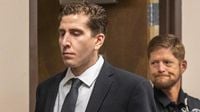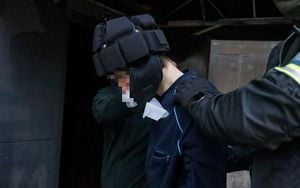BOISE, Idaho -- The legal battle surrounding Bryan Kohberger, accused of the brutal murders of four University of Idaho students, is intensifying as his trial approaches, set to begin in August 2025. Kohberger, charged with four counts of first-degree murder for the deaths of Kaylee Goncalves, Madison Mogen, Xana Kernodle, and Ethan Chapin on November 13, 2022, faces a significant amount of evidence being admitted by the court, including DNA found on a knife sheath and his online activities leading up to the tragic events.
Judge Steven Hippler is allowing prosecutors to present substantial evidence that could be pivotal in the case. Among the key pieces of evidence is DNA found on a knife sheath discovered near victim Madison Mogen's body. Prosecutors allege that this DNA matches Kohberger's, leading to questions about his whereabouts during the early morning hours of the murders.
In a parallel to other high-profile death penalty cases, Kohberger must decide whether to accept a plea deal to avoid a potential death sentence. While his attorneys have entered not guilty pleas on his behalf, the possibility of a plea deal remains uncertain. The brutality of the killings, which shocked the community and drew national attention, adds to the complexity of the case.
The trial's venue was moved from Moscow to Boise to ensure a fair jury selection process, similar to the recent case of Chad Daybell, who was convicted of murder and sentenced to death in Idaho. Kohberger's trial is set to begin with jury selection at the end of July 2025, and the process will include selecting jurors who are 'death qualified,' meaning they must be willing to consider the death penalty if aggravating factors are proven.
In June 2023, prosecutors filed a notice of intent to seek the death penalty, citing multiple victims, the heinous nature of the crimes, and Kohberger's potential as a continuing threat to society as aggravating factors. The prosecution has a mountain of evidence, but the defense is preparing to counter with its own arguments.
Key evidence includes Kohberger's internet searches prior to the murders, which reportedly included inquiries related to pornography with terms like "forced," "passed out," "drugged," and "sleeping." This information, along with a selfie taken by Kohberger hours after the murders, could paint a troubling picture of his state of mind at the time.
On the night of the murders, two surviving roommates, Dylan Mortensen and Bethany Funke, were home. Mortensen texted Funke at 4:22 a.m. saying, "No one is answering. I'm rlly confused rn." She continued to reach out to the victims, urging them to respond, but by 11:58 a.m., a 911 call was placed after Kernodle was found unresponsive. This timeline is crucial as it highlights the moments leading up to the discovery of the victims.
Further complicating Kohberger's defense, the judge has denied motions to strike the death penalty based on Kohberger's autism spectrum disorder diagnosis and the volume of discovery material that the defense claims it has not had sufficient time to review. The defense has argued that executing someone with autism would violate the Eighth Amendment's prohibition on cruel and unusual punishment.
As the trial date approaches, Kohberger's legal team is also investigating alternative suspects, claiming to have found a tip that could point to another individual involved in the crime. Lead defense attorney Anne Taylor stated, "We came across a tip that would appear to be an alternate suspect and we're trying to work through that as rapidly as we can." However, no formal evidence has been submitted to the court yet.
In a striking development, Kohberger's online behavior has come under scrutiny. Just days before his arrest, he took a selfie in a black robe, which has raised eyebrows. His browsing history shows he searched for images of female students from the University of Idaho and Washington State University, some of whom were friends with the victims. This could suggest a pattern of behavior that prosecutors may use to bolster their case.
As the trial nears, the emotional weight of the case looms large. The murders of Goncalves, Mogen, Kernodle, and Chapin not only devastated their families but also shook the community and the nation. The desire for justice is palpable, but Kohberger, like any defendant, is presumed innocent until proven guilty.
In a courtroom filled with tension, the jurors will be tasked with sifting through the evidence, determining the truth behind the tragic events of that night. Kohberger's presumption of innocence and the concept of reasonable doubt remain critical factors as the trial unfolds. As his attorney stated, "Kohberger is innocent, your Honor, but it's the country that has decided he is guilty." The outcome remains uncertain, but the implications of this case will be felt for a long time.





